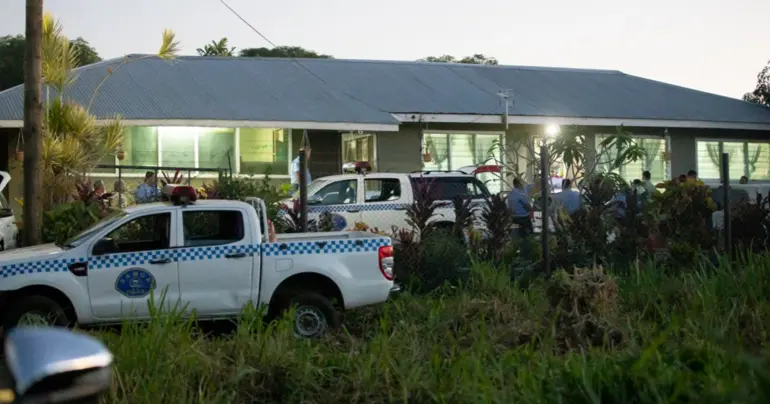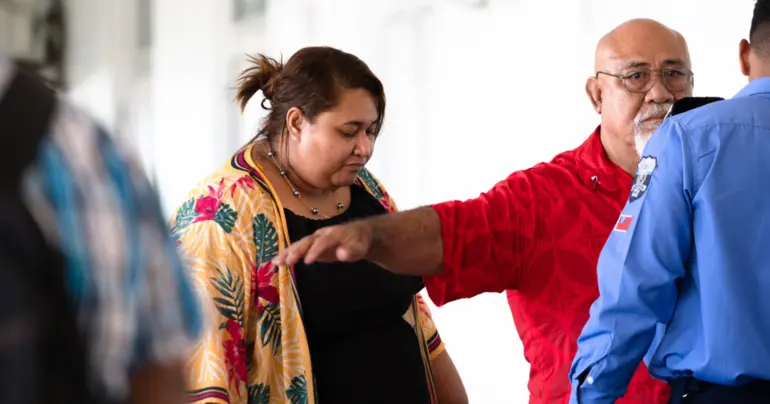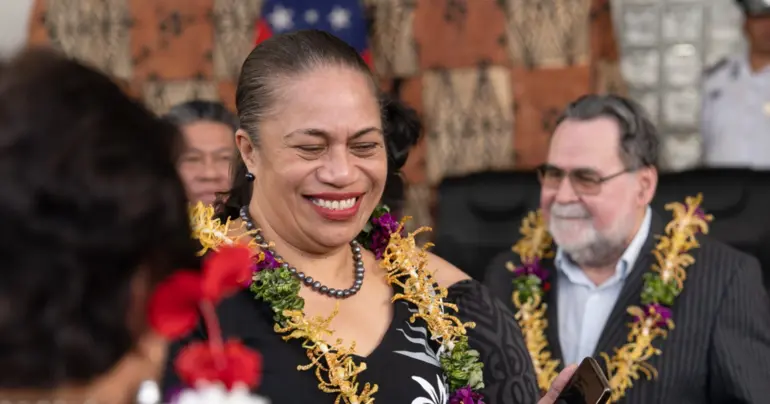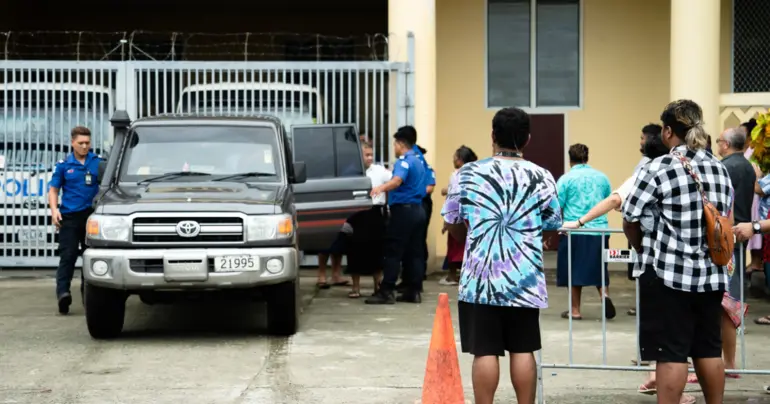Minister stands by L.T.C. Inquiry report
 By Matai'a Lanuola Tusani T - Ah Tong
•
25 April 2020, 6:00PM
By Matai'a Lanuola Tusani T - Ah Tong
•
25 April 2020, 6:00PM
The Chairman of a Parliamentary Commission of Inquiry into the works of Land and Titles Court (L.T.C.) in 2016 that preceded three controversial pieces of legislation for reshaping the judiciary is standing by the findings in the report.
The Minister of Agriculture and Fisheries and former Chairman of the initial L.T.C. Committee, Lopao’o Natanielu Mua says everyone is entitled to their own opinion.
“I have done my job and whatever the different views are [on the issue] I will not comment on that,” he said.
Asked whether the current bills before Parliament for reshaping the L.T.C. reflect the recommendations from the then L.T.C. Inquiry Committee Lopao’o did not answer directly.
“Everything you want to know is in the report,” he said.
The bills include a Constitution Amendment Bill 2020, the Land and Titles Court 2020 and the Judicature Bill 2020.
The Prime Minister, Tuilaepa Dr. Sailele Malielegaoi, in tabling the legislations in Parliament last month said the proposed changes reflect recommendations from the L.T.C. Committee report.
Tuilaepa emaphsised the amendments is to accommodate grievances from members of the public who have been victims of unjust decisions from the Court and delays in Court rulings.
In the 59 page report that followed the previous inquiry, the Committee detailed submissions from members of the public including that from the Ministry of Justice, Courts and Administration.
Among many problems identified by the Committee with L.T.C. are inconsistent decisions between judges of L.T.C., unsigned decisions, multiple adjournments to cases and incomplete records kept by the Ministry of Justice amongst others.
In June 2015, from evidence before the committee, it stated that more than 90 percent of rulings by the Court of First Instance have applications for appeal.
The submission from the M.J.C.A. in June 2016 noted there is a steady increase in the number of appealed cases.
From the submission, the Committee made recommendations to prioritise and restructure the L.T.C. Court to “officially recognise the Judicial Privilege of the L.T.C. which handles matters on our customary land and titles to be consistent with the recognition awarded the Supreme Court”.
In its rationale, the Committee said it witnessed the inequality in the privileged status accorded to the L.T.C. and the criminal courts.
The inequality referred to is that only 10 percent of budget appropriation is allocated to L.T.C.; there is no allocated room for mediation and salaries and benefits differ for the Judges “despite similar judicial duties”.
“It is therefore the Committees belief that equal privileges should be awarded to the L.T.C. such as is the case for the Supreme Court,” the report says.
“The Committee points out that after a person has served a sentence given by the criminal courts, they are free.
“On the other hand, if a person is served an unjust decision from the L.T.C., past, present and future generations are affected.
“Despite the uncertainty of whether to recommend a restructuring of the L.T.C. as it is a costly exercise, it was expressed by the majority that this is one solution to assist the public in seeking justice.”
The Committee had then proposed reorganisation that includes a L.T.C. High Court, Court of Appeal and Court of First Instance.
“This restructuring ensures that the importance of the L.T.C. is reflected within the Judiciary,” the Committee claims.
“With the proposed structure, the public will be allowed two opportunities for their cases to be reviewed after the hearing in the first instance.
“Consequently, the public will not seek a Judicial Review from the Judicial Service Commission but from the Land and Titles High Court.
According to submissions from members of the public heard before the Committee, it highlighted grievances in the extensive period of the delay in delivering rulings.
“The Committee found that some families have waited rulings delayed by 12 months to 30 years,” the report stated.
“The delay in the rulings leaves an open opportunity for corruption.”
A submission to the Committee mentioned a case which is more than 30 years old and to date, is still awaiting a written ruling.
Consequently, it has caused conflict and discontent between families because of the differences in opinion as to the state of the land.
“The verbal ruling was made however it was the inefficiency of the presiding judge that the Ministry cannot confirm this decision as a result of a non-existence written record,” the Committee found.
“The Committee is dismayed that despite the Judge residing overseas, the Courts have not made any effort to approach the responsible Judge when he is on-island or follow up with the backlog in cases.”
Another submission from a member of the public was in relation to when parties to a case approach the Office for records, they are informed that the records are lost.
“The absence of written rulings not only disrupts the work of the Office, but families will live in disharmony and discontent,” it stated.
“One witness was frustrated with the delay in a decision on their application for appeal which was considered by the previous President who has now resigned.
“For more than five (5) years they waited for the ruling.
“When the case was called before the Supreme Court, the same application for appeal was heard with an additional party to the proceedings therefore the same matter was heard twice.”
Another major frustration amongst the witnesses at the time was the inconsistent rulings where some were verbal and others not.”
A senior lawyer and former Director of the National Prosecution Office, Mauga Precious Chang said separating the L.T.C. Court is not the solution to the grievances from the members of the public.
In a previous interview, Mauga said resourcing the L.T.C., install a case management system and offer more training for L.T.C. Judges are key to the conflicts from the Court.
She explained that rather than funding the L.T.C. that is under-resource the proposed changes is giving the Judges more power to deal with legal matters that includes the interpretation of the Constitution.
The former Attorney General, Taulapapa Brenda – Heather Latu agreed that it all comes down to the selection of the Samoan Judges and training.
She made reference to the more than 90 percent cases in the Court of First Instance that have been appealed by the public stating it was clear that “there is no confidence” in the decisions from the L.T.C. Judges
“There is a mentality that it [gaps in decisions] would be picked up at the appeal level,” said Taulapapa.
“So they are not even trying to do the right thing so why are people wasting their efforts [in the L.T.C. Court].
“There is a real issue of integrity and capacity that was in that Parliamentary report [L.T.C. Committee 2016] and there needs to strengthen the selection process.”
Taulapapa added that one of the most important criteria that was included in the selection criteria for a Samoan Judge is the regard to their good character and their ability.
She said that has been removed from the proposed selection criteria to have clearance from the Police report.
 By Matai'a Lanuola Tusani T - Ah Tong
•
25 April 2020, 6:00PM
By Matai'a Lanuola Tusani T - Ah Tong
•
25 April 2020, 6:00PM











